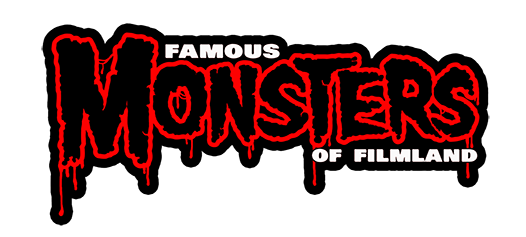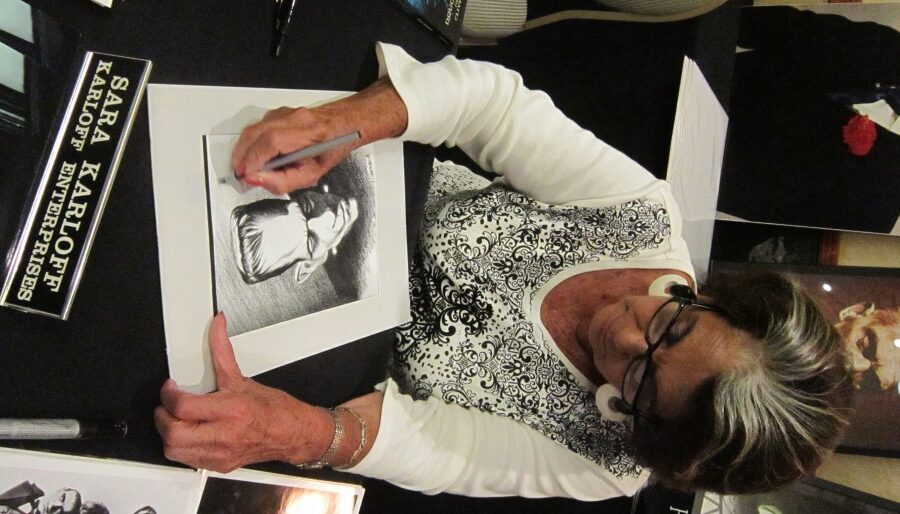When Lon Chaney Sr. drove by a tall, thin contract actor waiting for a bus one night in the pouring rain, the famous movie star did more than just offer this unassuming Englishman a ride home; he gave his passenger some acting tips that would forever change his life: “Find something that no one else is doing or willing to do, and do it better than anyone else; leave your mark.”
The unassuming passenger, of course, was Boris Karloff.
From its 1910 screen debut to the recent I, FRANKENSTEIN and upcoming Whale/Karloff remake, Mary Shelley’s “man playing God” tale has cinematically endured for over a century, largely due to the “quarterback” and “maestro” of all monsters, Boris Karloff. Twice inscribed on Hollywood’s Walk of Fame, twice featured on the U.S. stamp, his voice heard every Christmas throughout millions of homes, Karloff indeed left his mark—an image forever “stitched” into our psyche.
Famous Monsters recently managed to speak with Sara Jane Karloff, the only child of Boris Karloff and caretaker of his legacy. Sara shares her famous father’s story of grit, humility and determination along a tough, grueling road to stardom to be forever remembered as one of the most kindest, compassionate actors in Hollywood in direct irony of the roles he played.
Famous Monsters. Was being a Hollywood legend always part of your father’s “to-do” list?
Sara Karloff. Stardom was not on my father’s mind when he was starting out; he was simply passionate about acting.
FM. Your father certainly had his share of hardships and challenges before stardom. He spoke with a lisp. He stuttered. He was told by family that he didn’t have the right look for acting. But most astonishingly, he spent 20 years working as a laborer while doing bit roles in movies.
SK. I heard my father say once in an interview that he’d been in Hollywood for 10 years doing films, and yet he was the only person who ever knew he’d been in Hollywood 10 years. FRANKENSTEIN was his 81st film (made when he was 43), and hardly anyone had seen the first 80. And no one expected FRANKENSTEIN to be the tremendous success that it was, or expected the creature to be the star of the film. My father wasn’t even invited to the premiere!
FM. Tell us about the early creation stage of your father’s career.
SK. When my dad first started, he left England and took a ship to British Columbia, taking a job as a farm worker as his “day job” while hoping to become an actor, having no formal training whatsoever. He spent his first 10 years in repertory theater for three different groups in British Columbia. To get parts, he presented himself as an “experienced” British actor, when in fact, he’d only seen the plays in London. He once told a story on himself that when the curtain went up on his first performance, his salary was $30 per week. But when the curtain came down that night, his salary became $15, because it was abundantly clear that he had never set foot on a stage before.
But he was a fast learner, and stuck with it, doing three to five plays a week, sometimes getting paid, sometimes not. He painted sets, dug ditches on the side, took lots of in-between jobs, such as driving trucks and working for the British electric company so he may continue learning his true trade. It was his passion to be an actor.
FM. Was there ever a time during your dad’s twenty-year “building” period that he gave up acting completely?
SK. [chuckles] Not in his mind.
FM. Your father faced family criticism for being an actor, even after the success of Frankenstein and The Mummy. And being a soft, gentle man, no doubt this must have affected him.
SK. My father was not unusual in that he hoped for the approval of his family, being the youngest of nine brothers by seven years. Following the success of FRANKENSTEIN and THE MUMMY, my father finally returned to England after 25 years of being away, to work on THE GHOUL. He attended a press conference with three of his brothers, and it was then that his oldest brother, Sir John, asked him what he was being paid, and told him that he’d better be saving the money, because it would never last.
FM. Amongst his many injuries, your father hurt his back carrying Colin Clive up the stairs in the original Frankenstein, and broke his hip during the windmill scene in the BRIDE OF FRANKENSTEIN. No doubt he had to be in good physical condition to withstand such battery, especially at his age. Did your father have a special workout regimen?
SK. It was a combination of him being naturally fit, and years of working hard labor-odd jobs that made him fit. Digging ditches, hauling cement, whatever that was needed to be done to [financially] sustain himself.
FM. I read that because of back problems earlier in his life, your father was not able to fight in World War I. Was enlisting in the war something your father contemplated doing?
SK. Although my dad was a British subject, he was very patriotic, and would have enlisted. However, on top of other physical setbacks, my father had a slight heart murmur and flat feet.
FM. Your father was an admirer of Lon Chaney, Sr. Was it Chaney that inspired your father to act in horror films?
SK. No, my father was simply an admirer of Lon Chaney Sr., as was everyone, Chaney being a brilliant, innovative artist and the biggest name on the Universal lot.
My father had the opportunity to follow Lon Chaney’s advice, “Leave your mark,” when he was offered the role as the Frankenstein monster. That part would have been offered to Chaney had he not so tragically died at an early age. Bela Lugosi, who was a classically trained stage actor, had turned down the role because it had no dialogue, and because my father had been a starving actor for so long, he jumped at the chance. And thanks to the genius of [makeup artist] Jack Pierce, the direction of James Whale, and the cast as a whole, it became cinema history.
FM. Did your dad mind being typecast or labeled “monster?”
SK. Not at all, because for one, it kept him working. Secondly, he felt that anyone—whatever their chosen profession might be—was lucky if they were able to establish a niche or leave a trademark. And of course, he was lucky enough to branch out into other things as well. He’s done some fine work on Broadway, an enormous body of radio work, had three television series of his own, and guess starred on all the prominent shows of the day. He did far more than just monster roles.
FM. And aside from being known as “Mr. Halloween,” he’s also recognized as “Father Christmas,” largely for his Grammy-winning How the Grinch Stole Christmas.
SK. He left his mark on two of our favorite holidays.
FM. Your father gave generously to various charities and had a great love for children. Tell us, what exactly were the roots of your father being such a kind and compassionate person?
SK. He was inherently a lovely human being. A typical English gentleman, and had been raised that way. His interests included gardening, reading, animals (which included 20 dogs and a 400-pound pig) and he loved the game of cricket. A typical English gentleman; the antithesis of the roles he played.
FM. Being an avid reader who adored literature, I wonder if your father felt that some things in Mary Shelley’s novel should have been kept in for the movie.
SK. Well, my father had absolutely no say in the script he was handed. However, Kenneth Branagh’s MARY SHELLEY’S FRANKENSTEIN certainly followed the novel far more closely than James Whale’s version, and was not as successful a film.
FM. Your family is currently retrieving petitions on your website, Karloff.com, in efforts for your father to receive the Lifetime Achievement Award, which I think is marvelous.
SK. Yes, a fan is managing that.
FM. One of your father’s greatest achievements was helping start the Screen Actors Guild. Can you tell us about that?
SK. He was passionate about the founding of the Screen Actors Guild, because he and the other founding members had suffered at the hands of tyrannical studio bosses and directors. Starving actors [in those days] were treated like pieces of meat. My dad, along with the other members, felt that once they gained a certain position in their profession, it was very important for them to give back and speak out on behalf of other actors and their rights, making sure they were treated better and that working conditions and working hours for actors were improved. He was involved with SAG for many, many years, and was delighted to be so, but was also very quiet about it.
FM. He totally put his career on the line.
SK. That’s right. He and the other founding members would park their cars blocks away from one another’s houses and walk to the meetings. At parties, they’d dance near each other and whisper, ‘Meeting Tuesday night at so-and-so’s house,’ and dance on by. It was very hush-hush.
FM. Lots of cool stuff on your website, such as a Boris Karloff artists’ gallery filled with awesome, fresh new talent, and for comic book fans, a republishing of “Karloff’s Tales of Mystery” by Dark Horse Comics, available in the site’s gift shop. Was it hard getting Dark Horse as a publisher?
SK. It wasn’t hard at all, and it turned out to be a wonderful collaborative with Dark Horse.
FM. A little on Sara Karloff. You were born while your father was filming SON OF FRANKENSTEIN, and it was reported that your father rushed to the hospital in full monster makeup from the set. Is this true?
SK. No, that’s an urban legend.
FM. Tell us, who have been some of the most interesting Boris Karloff fans that have come up to you at shows?
SK. All have been interesting, and all so respectful. It’s a rewarding opportunity for me to hear so many stories and nice things said about my father.
FM. How was your recent visit to Monsterpalooza 2014 in Burbank, California?
SK. It was our fifth year there, and it’s always wonderful. [The facilitators] have done a marvelous new show, very family-friendly, and they take very good care of their guests.
FM. Have you ever considered writing a personal memoir on your dad?
SK. No, because the best biographies have already been done—six in total. A new superb biography of my dad, BORIS KARLOFF: MORE THAN A MONSTER (available at Karloff.com) is outstanding. Author Stephen Jacobs poured 10 years of research into it.
FM. What do you think your father would say to today’s aspiring actors, writers and artist trying to establish themselves in such a competitive field?
SK. “You’d better have fire in your belly, because rejections will come. But if you’re passionate about it, there will be no better profession in the world.”
FM. Out of curiosity, Sara, do you ever compare “other” Frankenstein monsters with your father when watching horror films, saying, “This guy doesn’t even come close to my pop”?
SK. I actually don’t watch horror movies—they scare me!
Interview and photo by Michael Lizarraga.


